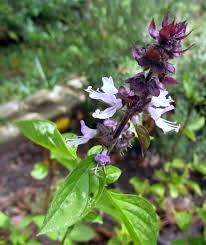If you are an athlete or fitness enthusiast that tries to eat fresh and healthy while on the go, it’s important to keep an eye out for proper washing and disinfecting methods. Eating in unfamiliar places, not washing fruits and vegetables properly, not cooking meats to the correct temperature, seasonal changes, or forgetting to wash your hands; these are all possible ways to get an intestinal infection. Having an infection can cause extreme discomfort, frequent visits to the bathroom, and, when an infection goes untreated, it can cause severe dehydration and subsequent health complications. In short, they are anything but fun.
 While it most cases it is necessary to take anti-parasitic or antibiotic treatment prescribed by a doctor, there are a series of natural treatments that can help reduce your risk for getting an intestinal infection and relieve the very uncomfortable symptoms you might experience when you have been diagnosed.
While it most cases it is necessary to take anti-parasitic or antibiotic treatment prescribed by a doctor, there are a series of natural treatments that can help reduce your risk for getting an intestinal infection and relieve the very uncomfortable symptoms you might experience when you have been diagnosed.
In this article, I will give you an overview of intestinal infections – what they are, the most common types, the risk factors, and the symptoms. I will also share my own recent experience with intestinal parasites with you, and tell you how I was able to relieve symptoms and discomfort through natural means.
What are Intestinal Infections?
Gastro-Intestinal infections, often misnamed stomach infections (except for a few strains of bacteria and parasites, infections rarely occur in the stomach due to its acidic environment), occur when bacteria, a virus, or a parasite colonize part of the digestive tract. These don’t allow your natural bacteria or intestinal walls do their job properly. While they can live in many parts of the body, they usually prefer the walls of the intestine because of the pH and rich source of nutrients.
According to the University of Maryland Medical Center, the following elements may raise your risk for intestinal infections:
- Living in or visiting an area known to have parasites
- International travel
- Poor sanitation (for both food and water)
- Poor hygiene
- Children and the elderly are more likely to get infected.
- Exposure to child and institutional care centers
- Having a weakened immune system
- HIV or AIDS
What are the Symptoms of Intestinal Infections?
While there are symptoms specific to each type of infection, there tend to be a series of common symptoms. Symptoms may include:
- Fever
- Abdominal pain
- Diarrhea and dysentery (loose stool with blood or mucus)
- Nausea or vomiting
- Rashes in the genital or anal area
- Feeling tired
- Weight loss
- Tenderness
- Muscle and bone aches
- Dehydration
When I first became ill, I felt an extreme sense of tiredness and achiness about a day before I experienced any of the other symptoms. The next day, when I started feeling sore muscles, abdominal pain, nausea, and frequent bowel movements, I knew that something was wrong. I experienced every single one of the symptoms above for three days until I finally realized that it wasn’t a the flu, or a simple stomach ache that was affecting me. By this time, I was very dehydrated and had to be put on a wide-spectrum antibiotic/anti-parasitic treatment.
How Can You Treat Intestinal Infections Naturally?
Even after beginning pharmaceutical treatment, I wasn’t happy with how I was feeling, even when some of the most uncomfortable symptoms started to subside. This was when I did my own research and started asking steadfast followers of natural health treatment for tips on how to feel like my old self again. Here are the three most effective natural infection aides.
Pericon tea:
 The scientific name for this plant is Tagates lucida, and it is native to Mexico and Central America. As my mother in law is Guatemalan, it is no wonder why this was a go-to natural treatment recommended to me. It was used by Aztecs to flavor cocoa, and it has a tarragon-like flavor. Its medicinal properties include alleviating feverish illnesses, indigestion, nausea and diarrhea – many of the symptoms of intestinal infections. Scientific studies show that it does, indeed, have antibacterial and antifungal properties.
The scientific name for this plant is Tagates lucida, and it is native to Mexico and Central America. As my mother in law is Guatemalan, it is no wonder why this was a go-to natural treatment recommended to me. It was used by Aztecs to flavor cocoa, and it has a tarragon-like flavor. Its medicinal properties include alleviating feverish illnesses, indigestion, nausea and diarrhea – many of the symptoms of intestinal infections. Scientific studies show that it does, indeed, have antibacterial and antifungal properties.
To prepare the tea, you can use dried pericon leaves, or purchase pericon tea bags. Steep in almost-boiling water for 4-5 minutes, and sip.
Wild Basil Tea (Cinnamon Basil)

During the tail end of the illness as my body tried to compensate for the imbalance experienced in the several days prior, I found that I felt extremely bloated, and started to experience constipation. This is often a side-effect of the pharmaceutical treatment that kills off the parasites. When I asked elders in my community, they recommended I drink wild basil tea, often known as purple basil or cinnamon basil. The leaves are smaller than the basil found in supermarkets, and the plants produce small purple flowers (thus the name purple basil). If you don’t have this sort of basil available, conventional basil will do.
Basil does, indeed, have anti-microbial properties, which could have assisted with any residual bacterial issues I may have had. Basil also contains a compound called beta-caryophyllene, which helps to treat bowel inflammation, and other compounds help to alleviate gas, spasms, and lack of appetite.
To prepare the basil tea, boil two springs, with the flower and stems, in two cups of water for about 10 minutes. Run the water through a sieve, and you can mix it with a teaspoon of honey, for taste. Drink in the morning and at night, or when uncomfortable from bloating.
Fermented Foods
Once the infection was cured, I still didn’t feel quite myself. The multiple pharmaceutical and natural anti-bacterial substances I put in my body most likely also killed off all the good bacteria that kept my bowel and immune system functioning properly. To get my bowel back in balance, I started eating and drinking fermented foods, like natural (non-flavored) yogurt, kombucha, and miso soup. These foods have probiotic properties, which help to recolonize my gut with healthy bacteria to prevent a resurgence of the infection, and get me feeling normal again.
The beneficial properties of fermented foods aren’t just hearsay. Plenty of scientific evidence shows that they are beneficial for your health, especially if you are recuperating from anti-bacterial treatment.
—
These three natural substances helped me get back on the road to recovery and and helped me to feel like myself again in only a weeks’ time. It is important to know that all treatment should be discussed with your doctor, and you should never self-medicate. However, effective natural substances can help to accelerate the recuperation process, and may even help to prevent infection if taken when you know your body is most vulnerable to illness.
If you are an athlete, making sure your immune system is consistently in tip-top shape is key to staying at the top of your game, so preventing and being quick to treat your body at the first sign of infection should be a regular part of your daily routine.



